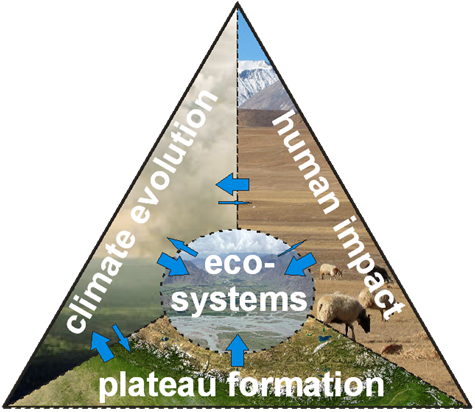Past and present human impact on Kobresia pastural ecosystems as deduced from soil organic matter studies
DFG KU 1184/14
SPP 1372 TIP
Von 12/2008 Projektleiter: Yakov Kuzyakov, Georg Guggenberger
Mitarbeiter: Per Schleuss, Lena Becker, Laura Steingräber, Peili Shi, Xiaogang Li, Sandra Spielvogel
Kobresia pastures represent the worlds largest alpine ecosystem. There is a debate if the development of the Kobresia biome is climate-driven or if it represents a human induced pastoral pseudoclimax replacing taller grassland and forest. Present sedentarisation programs lead to pronounced overgrazing and land degradation. Consequences of climate change/land-use change interactions may be liberation of soil-borne CO2 to the atmosphere, though field data are insufficient for a process-based and quantitative understanding. The goal of the project is to increase the knowledge about the Holocene and present development of the Kobresia pygmaea pastoral ecosystem by employing soil and soil organic matter studies of different spatial and temporal scales. For the reconstruction of the vegetation and land use history, soil geoarchives from the Kobresia biome will be assessed by means of geomorphic and organic soil biomarker studies. Soil organic carbon storage depending on grazing management will be analyzed in an exclosure network along altitutidinal and latitutidinal gradients. Process studies on carbon fluxes in the plant-soil-atmosphere system will be performed by 13C pulse-labeling experiments at the Kema field station. The tight project integration into the "Kobresia cluster" is a prerequisite for a more unbiased reconstruction of the Holocene climate and vegetation evolution and a more reliable parameterization of models analyzing recent energy and matter fluxes.
Homepage: http://www.uni-goettingen.de/de/forschung/69499.html
Publikationsliste dieses Projekts
| Hafner, S; Unteregelsbacher, S; Seeber, E; Becker, L; Xu, X; Li, X; Guggenberger, G; Miehe, G; Kuzyakov, Y: Effect of grazing on carbon stocks and assimilate partitioning in a Tibetan montane pasture revealed by 13CO2 pulse labeling, Global Change Biology(18), 528–538 (2012) -- Details |
| Unteregelsbacher, S; Hafner, S; Guggenberger, G; Miehe, G; Xu, X; Liu, J; Kuzyakov, Y: Response of long-, medium- and short-term processes of the carbon budget to overgrazing-induced crusts in the Tibetan Plateau, Biogeochemistry, Online First (2012), doi:http://dx.doi.org/10.1007/s10533-011-9632-9 -- Details |
Siehe auch:
- Experiment: KEMA 2010: Interdisziplinäres Atmosphäre Ökosystem Experiment in Kema, Tibetisches Hochplateau
- Experiment: Xinghai 2009: Grazing Exclusion Experiment Xinghai, Tibetan Plateau
- Messfläche: Kema: Kobresia Ecosystem Monitoring Area (KEMA) and Naqu Ecological and Environemental Observation and Research Station
- Messfläche: Xinghai: Xinghai longterm Vegetation Monitoring Site

